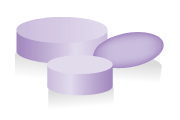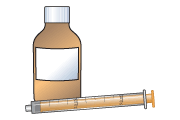Oxybutynin for daytime urinary symptoms
This leaflet is for parents and carers about how to use this medicine in children. Our information may differ from that provided by the manufacturers, because their information usually relates to adults. Read this leaflet carefully. Keep it somewhere safe so that you can read it again.
Name of medicine
Oxybutynin
Common brands: Cystrin®, Ditropan®
Modified-release tablets: Lyrinel XL®
Why is it important for my child to take oxybutynin?
This leaflet is about the use of oxybutynin for urinary symptoms including daytime wetting, frequent passing of urine and urgency to pass urine.
Oxybutynin relaxes the muscles of the bladder. This will mean that the bladder can hold more urine (wee) and will help your child to control their bladder so that they do not wet themselves.
What is oxybutynin available as?
Tablets: 2.5 mg, 3 mg, 5 mg; these contain a small amount of lactose
Modified-release tablets (Lyrinel XL): 5 mg, 10 mg; these contain a small amount of lactose
Liquid medicine: 2.5 mg in 5 mL
When should I give oxybutynin
Oxybutynin tablets or medicine may be given two or three times each day. There is a special, modified-release tablet called Lyrinel XL that is given once a day.
Twice each day
- If it is to be given twice each day, this should be given once in the morning and once in the evening. Ideally, these times are 10–12 hours apart, for example some time between 7 and 8 am, and between 7 and 8 pm.
Three times each day
- If it is to be given three times a day, this should be first thing in the morning, early afternoon (or after school) and at bedtime. Ideally, these times should be at least 4 hours apart.
Modified-release (Lyrinel XL) tablets
- These tablets are given only once a day.
Give the medicine at about the same times each day so that this becomes part of your child’s daily routine, which will help you to remember.
How much should I give?
Your doctor will work out the amount of oxybutynin (the dose) that is right for your child. The dose will be shown on the medicine label.
It is important that you follow your doctor’s instructions about how much to give.
How should I give oxybutynin?

Tablets
- Tablets should be swallowed with a glass of water, squash or juice. Your child should not chew the tablet.

Modified-release tablets (Lyrinel XL)
- Modified-release tablets should be swallowed whole with a glass of water, juice, or squash. Your child should not chew the tablet because this will change how it works.

Liquid medicine
- Shake the medicine well.
- Measure out the right amount using an oral syringe or a medicine spoon. You can get these from your pharmacist. Do not use a kitchen teaspoon as it will not give the right amount.
When should the medicine start working?
It may take a few days (sometimes a week or more) for the medicine to help your child’s bladder symptoms. Continue to give the medicine as your doctor has told you to during this time.
What if my child is sick (vomits)?
- If your child is sick less than 30 minutes after having a dose of oxybutynin, give them the same dose again.
- If your child is sick more than 30 minutes after having a dose of oxybutynin, do not give them another dose. Wait until the next normal dose.
If your child is sick again, seek advice from your family doctor, nurse, pharmacist, or hospital. They will decide what to do based on your child’s condition and the specific medicine involved.
What if I forget to give it?
If you normally give oxybutynin twice a day
If you remember up to 4 hours after you should have given a dose, give your child the missed dose. For example, if you usually give a dose at about 7 am, you can give the missed dose at any time up to 11 am. If you remember after that time, do not give the missed dose. Wait until the next normal dose.
If you normally give oxybutynin three times a day
If you miss a dose, wait until the next normal dose. Do not give the missed dose.
Modified-release (Lyrinel XL)
If you forget to give a dose, you can give the missed dose first thing in the morning, as long as this is at least 12 hours before the next normal bedtime dose. If you remember after this, do not give the missed dose. You do not need to wake your child up to give them the missed dose.
Never give a double dose of oxybutynin.
What if I give too much?
If you think you may have given your child too much oxybutynin, contact your doctor or local NHS services (details at end of leaflet). Have the medicine or packaging with you if you telephone for advice.
Are there any possible side effects?
We use medicines to make our children better, but sometimes they have other effects that we don’t want (side effects).
Side effects you must do something about
If your child has an irregular or fast heart rate (fluttery or racing), contact your doctor straight away.
Your child may sweat less whilst taking oxybutynin. Be careful that they don’t overheat, particularly in hot weather and during exercise; make sure that they drink plenty of water.
Your child’s skin may become more sensitive to sunlight. Keep them out of strong sun. When outdoors they should wear long-sleeved tops and trousers and a hat, and use high-factor sun block (at least SPF 30).
Other side-effects you need to know about
These side-effects should get better after a week. If they don’t, contact your doctor.
Some children get a dry mouth for the first few days. Eating citrus fruits (e.g. oranges) and taking sips of water may help. This effect usually settles down quite quickly. If it doesn’t, contact your doctor.
Your child may feel sick (nausea) and get diarrhoea or constipation (difficulty doing a poo). If these effects cause problems, your doctor may give you some other medicines to help.
Some children may feel sleepy, get a headache, have changes in mood, see strange things (hallucinations), or get nightmares (although this is rare). Some children find that their eyesight is blurry or double.
Your child may have some problems passing urine (doing a wee). If this happens, contact your doctor.
There may sometimes be other side effects that are not listed above. If you notice anything unusual and are concerned, contact your doctor. You can report any suspected side effects to a UK safety scheme at mhra.gov.uk/yellowcard
Can other medicines be given at the same time as oxybutynin?
- You can give your child medicines that contain paracetamol or ibuprofen, unless your doctor has told you not to.
Check with your doctor or pharmacist before giving any other medicines to your child. This includes herbal and complementary medicines.
General advice about medicines
- Try to give medicines at about the same times each day, to help you remember.
- Only give this medicine to your child. Never give it to anyone else, even if their condition appears to be the same, as this could do harm.
- Make sure that you always have enough medicine. Order a new prescription at least 2 weeks before you will run out.
- Make sure that the medicines you have at home have not reached the ‘use by’ date on the packaging. Give old medicines to your pharmacist to dispose of.
If you think someone else may have taken the medicine by accident, contact your doctor straight away.
Where should I keep this medicine?
- Keep the medicine in a cupboard, away from heat and direct sunlight.
- It does not need to be kept in the fridge.
- Make sure that children cannot see or reach the medicine.
- Keep the medicine in the container it came in.
Who to contact for more information?
Your child’s doctor, pharmacist or nurse will be able to give you more information about oxybutynin and about other medicines used to treat daytime urinary symptoms.
England: NHS 111
Tel 111
www.nhs.ukScotland: NHS 24
Tel 111
www.nhs24.scotNorthern Ireland: NI Direct
Wales: NHS 111 Wales
Tel 111
www.111.wales.nhs.ukERIC: The Children's Bowel and Bladder Charity
0808 169 9949
www.eric.org.uk/Pages/Category/bowel-problemsCopyright disclaimer
Version [2]. © NPPG, RCPCH and WellChild, all rights reserved. Review by October 2017.
The primary source for the information in this leaflet is the British National Formulary for Children. For details on any other sources used for this leaflet, please contact us through our website, www.medicinesforchildren.org.uk.
We take great care to make sure that the information in this leaflet is correct and up-to-date. However, medicines can be used in different ways for different patients. It is important that you ask the advice of your doctor or pharmacist if you are not sure about something. This leaflet is about the use of these medicines in the UK, and may not apply to other countries. The Royal College of Paediatrics and Child Health (RCPCH), the Neonatal and Paediatric Pharmacists Group (NPPG), WellChild and the contributors and editors cannot be held responsible for the accuracy of information, omissions of information, or any actions that may be taken as a consequence of reading this leaflet.
